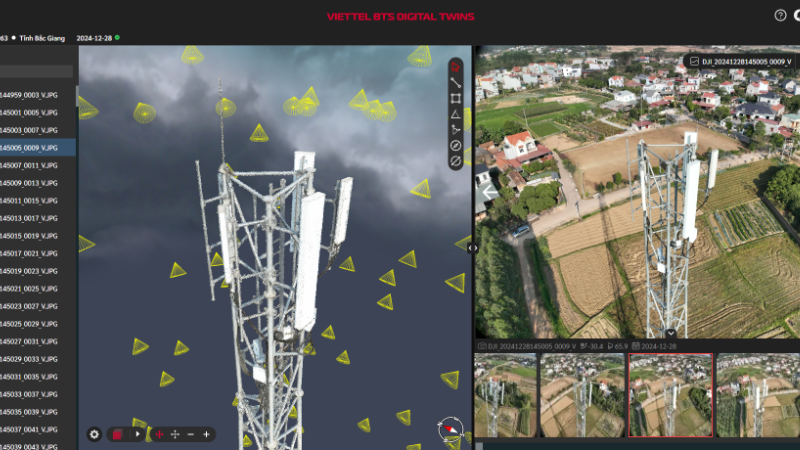What is AI AGENT?
AI Agent (also known as artificial intelligence agent) is an advanced form of software, designed to operate autonomously, performing specific tasks without the need for constant human intervention.
They have the ability to observe and analyze information from their surroundings, use this data to make inferences and make decisions, and then take actions to achieve their programmed goals.
Typical examples of AI Agents include virtual assistants on phones, chatbots to support customers on e-commerce sites, or robot control systems in factories.
Basic Components of AI Agent:
● Sensors: Similar to physical sensors on robots or APIs in software. They help the AI Agent collect raw data from the external environment to start the processing process.
● Processors: Here, data is analyzed thanks to artificial intelligence algorithms, such as machine learning or deep neural networks.
● Memory: Once the output information is available, this information will be stored for reuse. As a result, AI can learn from experience and optimize future actions.
● Actuators: Convert decisions into specific actions, such as mechanical controls in robots or executing commands on software.

Photo 1: AI Agent has the ability to observe and analyze information from the surrounding environment
Outstanding features of AI AGENT
● Autonomy: AI agents demonstrate autonomy by operating without constant human intervention. They can make decisions and take actions independently, allowing them to tackle complex tasks without detailed programming.
● Continuous Learning: Self-learning is a key feature of Artificial Intelligence (AI) Agents. Through the analysis of data from the environment and the feedback collected, AI Agents continuously improve themselves, helping them flexibly adapt to changes and improve operational efficiency.
● Reactive and proactive: AI agents not only respond to environmental changes, but also have the ability to predict and take action before an event occurs. One application of the reactive and proactive ability of AI agents is in the medical field. AI systems can analyze medical images such as X-rays and MRIs to detect abnormal or pathological signs early. In addition, they are also implemented in the management of health records and make recommendations based on data collected from smart wearable devices.

Photo 2: Outstanding features of AI Agent
AI AGENT's workflow
The operation process of an AI Agent can be described by a series of iterative steps, including:
Environmental Perception
● When receiving a request from a user, the AI Agent will analyze and break down the request into specific, actionable tasks.
● During the process, the AI Agent's sensor system will collect information from various sources, including transaction data, customer interaction history, external data sets, web search results, APIs, and even from other actors. This collection process is continuous, helping the AI Agent to update its knowledge base, automatically make adjustments, and fix errors if necessary.
● This information may include images, audio, text, sensor data, etc.
Processing
● AI Agent's central processing unit will use algorithms, deep neural networks, machine learning models, and artificial intelligence to analyze information and take appropriate actions.
● Throughout this process, the agent's memory will constantly store information, such as a history of decisions made or learned rules, making it possible for them to compare themselves, adjust their actions, and improve their performance over time.
● The process can include steps such as data filtering, feature extraction, object recognition, semantic analysis, and more.
Decision Making
● Based on the processed information and the set goal, the AI Agent selects the appropriate action.
● The process may include the use of search algorithms, planning, inference, etc.
Action
● Finally, through control mechanisms, the AI Agent will take actions based on the decision that has been made. For robots, the control mechanism can be the parts that help them move or manipulate objects. For software, this can be sending information or executing commands on the system
● These actions can be physical actions (e.g., moving, manipulating) or software actions (e.g., sending emails, retrieving data).
Learning and Adaptation
● AI Agent evaluates the results of actions and uses this information to improve performance in the future.
● This process may include the use of machine learning algorithms to update models and rules.
Example of the workflow of an AI Agent
Autonomous vehicles:
○ Awareness: Collects information from cameras, lidar, radar.
○ Processing: Analyze information to identify lanes, vehicles, pedestrians, etc.
○ Decisions: Choose actions such as accelerating, decelerating, turning left, turning right.
○ Action: Control the engine, brakes, steering wheel.
○ Learning: Update the recognition and control model based on driving experience.

Photo 3: AI AGENT's operation process
Popular types of AI AGENT today
AI Agents can be categorized in a variety of ways, depending on how they are designed and their goals. Here are some common types of AI Agents:
Simple Reflex Agents
● This is the simplest type of AI Agent, which works based on "if-then" rules.
● They respond to specific environmental stimuli based on predefined rules.
● They are incapable of remembering or learning from experience.
● Example: A robot is programmed to avoid obstacles by turning left when the sensor detects an obstacle ahead.
Model-based Reflex Agents
● This type of AI Agent is capable of predicting future states based on real-world models.
● They use information to map or visualize situations before taking action.
● This helps them make better decisions in complex environments.
● Example: A self-driving car uses a map model to predict the behavior of other vehicles and pedestrians.
Goal-based Agents
● This type of AI Agent seeks action to achieve a specific goal.
● They use search and planning algorithms to find the optimal sequence of actions.
● Example: A robot is programmed to move from point A to point B in a maze.
Utility-based Agents
● This type of AI Agent seeks action to maximize "utility" or value.
● They are not only interested in achieving a goal, but also in achieving it in the most effective way.
● For example, an AI Agent is programmed to play chess, not only interested in projecting champions, but also interested in maximizing scores.
Learning Agents
● This type of AI Agent has the ability to learn from experience and improve performance over time.
● They use machine learning algorithms to update models and rules.
● For example, an AI Agent is programmed to play video games, which can learn to play better by playing multiple times.

Photo 4: There are many different types of AI Agents
Benefits of using AI AGENT
AI Agent is not only a technology tool, but also a solution that changes the way we live and work. In life, they help save time through tasks such as scheduling, reminders, or answering questions quickly. Have you ever tried asking a virtual assistant like Google Assistant about today's weather? That's a good example!
In business, AI Agent brings outstanding benefits such as:
● Increased productivity: Automate repetitive processes, minimizing errors.
● Optimization: Chatbot supports customers 24/7, saving personnel costs.
● Data analysis: Learning Agents process big data to make accurate predictions and support decision-making.
According to Statista, the global artificial intelligence market is expected to reach a value of about $826.73 billion by 2030. This shows the huge potential of this technology in the future.

Photo 5: AI AGent brings many benefits to life
Application of AI AGENT in specific fields
AI Agent is being widely used in many areas of life and work, bringing great benefits. Here are some typical applications:
Virtual assistant
Virtual assistants such as Siri, Google Assistant, Alexa, Cortana, and more use AI Agent to understand and respond to user requests using voice or text.
They can perform a variety of tasks, such as answering questions, making appointments, playing music, controlling smart devices, and more.
Customer Care
The chatbot uses AI Agent to automatically answer customer questions, solve problems, and provide 24/7 support.
Health
AI Agent can be used to analyze medical data, aid in disease diagnosis, develop new drugs, and personalize treatments.
Transportation
Autonomous vehicles use AI Agent to recognize and react to their surroundings, making driving safer and more efficient.
AI Agent can also be used to manage traffic flow, optimize routes, and minimize congestion.
Production
Industrial robots use AI Agent to automate manufacturing tasks, such as assembly, welding, cutting, and more.
Retail
The recommendation system uses AI Agent to analyze customer shopping behavior and recommend suitable products.
Finance
AI Agent is used to analyze the market, detect fraudulent trading, and manage risk.
It is capable of processing large amounts of data in real-time, assisting investors in making informed decisions.
Education
AI Agent can be used to personalize the learning process, provide instant feedback, and assist students in learning more effectively.
They can also be used to create educational games and interactive learning materials.
Entertainment
AI Agents are used to create characters in video games, special effects in movies, and interactive entertainment content.
Security
AI Agent can be used to monitor public security, detect suspicious behavior, and prevent crime.
Photo 6: AI Agent applied in a variety of fields
AI Agent is being widely applied in many fields, from virtual assistants to autonomous vehicles and industrial robots... Its development can be both an opportunity and a challenge for humans. To master artificial intelligence, we need to learn how to take advantage of it today. Follow Viettel AI to access the most modern AI technologies!
Other news















